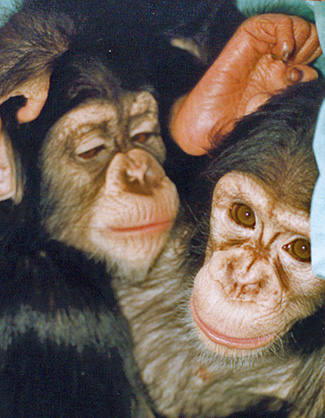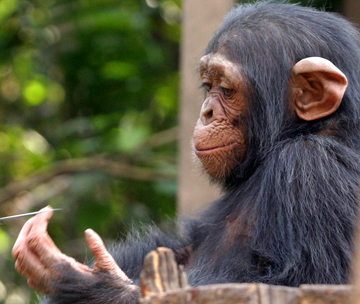
Photo Source: AP. Shared by Erwin De Laat, Owner of 2Space.net, Global Source of Information

Four baby chimpanzees were rescued from the SEMA Laboratory in Rockville, MD — a research facility that Jane Goodall visited and dubbed “the worst experience in my life.” Photo Source: From a collection compiled by Jake Conroy for Kinship Circle's Brenda Shoss. Jake is a former SHAC 7 prisoner, unjustly jailed for 4 years for “conspiracy” to shut down Huntingdon Life Sciences, an animal testing lab with multiple animal welfare violations in the USA and UK. Jake and his SHAC-USA codefendants, who reported the actions of others on their website, were also “guilty” of conspiracy to violate the Animal Enterprise Protection Act — a law crafted to defend animal-use industries from activists.

|
 |
DECEMBER 2011
New Report Prompts NIH Grant Freeze On Chimpanzee Experimentation. They are like us, yet not enough to cure us.
Banned across Europe and most of the world, only the U.S. and Gabon, in Africa, still conduct experiments on chimpanzees. They are most like us, yet not enough to generate data relevant to human health. Now, the Institute of Medicine agrees. Sort of.
An IOM landmark report says researchers can no longer warrant chimps as models for invasive medical experimentation. Chimpanzee research grants are frozen as the U.S. National Institutes of Health evaluates IOM findings. The report calls for stern limits, stipulating chimp use as a final option when biomedical research — i.e., animals artifically induced with human disease and poisoned on test drugs — is not viable in other human or nonhuman animals.
In part, a chimp moratorium stems from public outcry against an NIH plan to transfer nearly 200 chimps from New Mexico's nonresearch Alamogordo Primate Facility to Texas Biomed for aggressive experiments. NIH director Francis S. Collins, M.D. says relocation is suspended as the agency reviews chimp research at both the San Antonio lab and in general.
So the Alamogordo chimps, some lifelong lab inmates, are on hiatus and hopefully headed for permanent retirement. But fate is uncertain for America's other 937 chimps currently on record as test subjects. New regulations could prompt their early retirement. Or not. Ultimatly, sanctuary rests with enactment of the Great Ape Protection and Cost Savings Act (S. 810 / H.R. 1513); — an outright ban on Great Apes in medical experimentation. — Kinship Circle


“Science has advanced enough that chimpanzees should be a last resort”
Government adopts strict limits on chimp research
By Lauran Neergard, Associated Press
WASHINGTON — Days in the laboratory are numbered for chimpanzees, humans' closest relative. Chimps paved astronauts' way into space and were vital in creating some important medicines. But the government said Thursday that science has advanced enough that from now on, chimpanzees essentially should be a last resort in medical research — a move that puts the United States more in line with the rest of the world.
Chimps' similarity with people “demands special consideration and respect,” said Dr. Francis Collins, director of the National Institutes of Health.
His move came after the prestigious Institute of Medicine declared that most use of chimpanzees for invasive medical research no longer can be justified — and that strict new limits should determine which experiments are important enough to outweigh the moral cost of involving this species that is so like us.
“The bar is very high,” said bioethicist Jeffrey Kahn of Johns Hopkins University, who led the institute panel.
The group stopped short of recommending an outright ban, saying a handful of research projects today might still require chimps, but more importantly, that the animals might be required in the future as new diseases evolve and emerge.
Animal welfare groups welcomed the change but continue to push for Congress to pass legislation that would go a step further and phase out all invasive chimp research.
“Chimpanzees have provided limited value in research settings, and now alternative methods have been developed that will make their use all but obsolete” said Wayne Pacelle, president of the Humane Society of the United States.
But some scientists say it's not that big a change because chimp studies already were dwindling fast as researchers turned to less costly and ethically charged alternatives.
“The use of a chimpanzee in biomedical research is the rare exception,” said Dr. Thomas Rowell, who directs Louisiana's New Iberia Research Center, one of five research centers that houses chimps and other primate species used in both government — and privately financed studies.
It’s not clear how many of the nation's 937 research chimps — 612 of them owned by NIH — are in the midst of experiments that would be affected by new standards and could be moved into retirement instead. Most of the chimps are fairly old, as the nation has had a moratorium on breeding since 1995.
|

